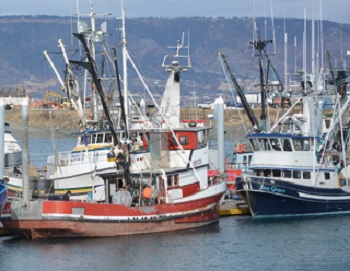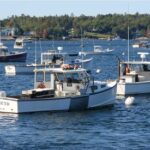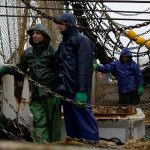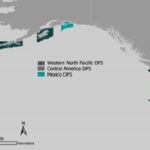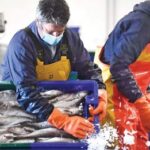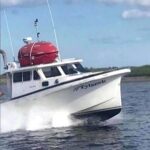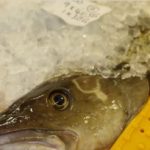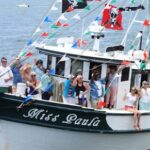Tag Archives: North Pacific Seafoods
Bristol Bay fleets call for greater price transparency
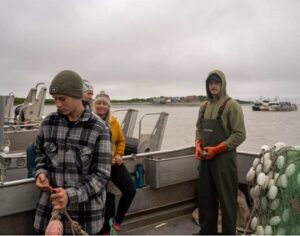 There’s a multi-decade precedent for Bristol Bay salmon processors to wait until the season is underway to announce what they’re willing to pay. Peter Pan shook up the industry in 2021 and 2022 by announcing a base price at the start of the season, but this year waited until mid-July, along with other processors in the region. Captain Konrad Schaad, of the Fishing Vessel Skua, says this model hurts fishers. “The producer gets paid what’s left over. We produce the fish and then it gets processed and sold and everything and everybody gets their cut, and then the morsels that are leftover, they give to us. There should be a fixed cost for what we produce here,” he said. In Bristol Bay, commercial fishing crews fish on what’s called an ‘open ticket. >click to read< 12:53
There’s a multi-decade precedent for Bristol Bay salmon processors to wait until the season is underway to announce what they’re willing to pay. Peter Pan shook up the industry in 2021 and 2022 by announcing a base price at the start of the season, but this year waited until mid-July, along with other processors in the region. Captain Konrad Schaad, of the Fishing Vessel Skua, says this model hurts fishers. “The producer gets paid what’s left over. We produce the fish and then it gets processed and sold and everything and everybody gets their cut, and then the morsels that are leftover, they give to us. There should be a fixed cost for what we produce here,” he said. In Bristol Bay, commercial fishing crews fish on what’s called an ‘open ticket. >click to read< 12:53
Photos: On the water with Bristol Bay’s protesting fishing crews
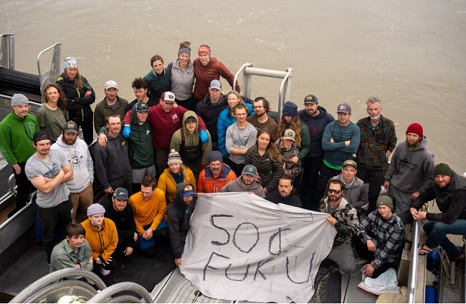 Commercial fishing crews joined together at the mouth of the Naknek River to peacefully protest the low price that processors are offering for this year’s sockeye salmon. They want processors to reconsider the 50 cents per-pound price, as well as more transparency in the fishery. The protest began at 6:00 AM on Thursday, July 20, and lasted through the day. >click to see the photos< 11:33
Commercial fishing crews joined together at the mouth of the Naknek River to peacefully protest the low price that processors are offering for this year’s sockeye salmon. They want processors to reconsider the 50 cents per-pound price, as well as more transparency in the fishery. The protest began at 6:00 AM on Thursday, July 20, and lasted through the day. >click to see the photos< 11:33
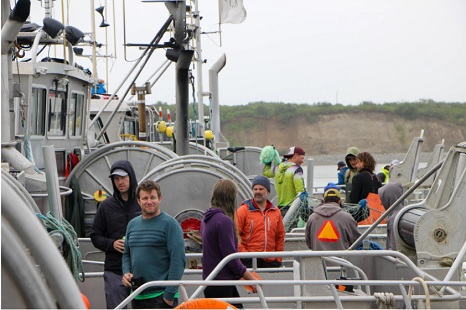
Bristol Bay fishermen protest low base price, lack of transparency
By 9 am, over one hundred boats are anchored in the Naknek River entrance, some after a night of fishing the Naknek-Kvichak. Ivan Basargin of the fishing vessel Top Notch is one of them. He’s here to join the demonstration against this year’s low price. Standing in the wheelhouse of a boat he built, he says this year’s low-price hits hard. “I’m going to pay my workers. I’m going to pay my bills. As far as living expenses, I haven’t decided yet. This 50 cents that I get, when I get home, it’s going to be a wash. I’m not going to have any money in the bank saved,” he said. Organizers of the protest are calling on processors to reconsider and improve the base price this season from 50 cents per pound, less than half of last year’s price. “If they know we can fish for 50 cents, we’re going to get paid 30 cents next year,” he said. “That will happen if we don’t do anything. Like today – this is a peaceful protest. We’re not trying to block people or anything. We’re just trying to show the world that we’re hurting, and we need some help.” Basargin says processors are claiming they are struggling financially too but he hasn’t seen evidence of this struggle. >click to read< 17:15

North Pacific Seafoods faces class action lawsuit for workers’ alleged rodent-infested, moldy lodging and wage theft
The seafood processing industry in Alaska attracts thousands of seasonal workers, many of whom are from out of state. North Pacific Seafoods Inc., responsible for roughly 10% of Alaska’s fisheries market and 800 seasonal employees annually, is facing a class-action lawsuit that claims its seasonal workers were provided unsafe, unsanitary working conditions, experienced wage theft and had their complaints to supervisors ignored. >click to read< 12:39
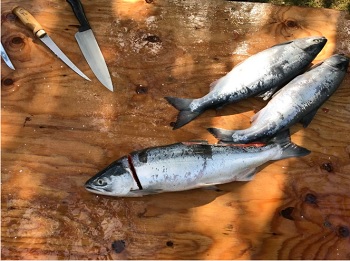
Bristol Bay Fisheries Report: July 24, 2020
A lull in returns today at 468,000 fish, the daily harvest bay-wide was about half what it was the day before. The total run is 55.9 million fish, about half a million away from last year’s. The U.S. Army Corps of Engineers has released the final environmental review for the proposed Pebble Mine. A Seattle-based seafood processor will pay out more than $440,000 to workers at a Bristol Bay cannery, the result of a settlement after the company was sued in June. “We think that it is a fair and just compensation for the workers that were held for 12 days at a hotel without being paid,” said Jonathan Davis, a managing partner of the San Francisco-based Arns Law Firm, which filed the lawsuit. The firm took on the case pro bono, so it will not receive any compensation for its work. The processor, North Pacific Seafoods, was sued for false imprisonment and failing to pay the workers, among other charges. >click to read< 15:30
Hiring seafood workers in Bristol Bay has been tough for years. This summer, it’s worse.
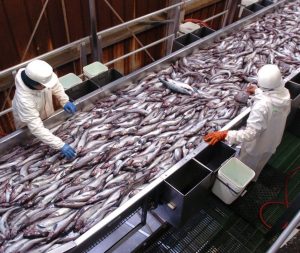 Seafood processors in Alaska’s Bristol Bay this summer have had trouble finding enough workers to handle the fish that come through their plants. Those in the industry say a confluence of factors, including a lack of visas for bringing foreign workers to the industry, a hotter economy in the Lower 48, and a record-breaking salmon run in Bristol Bay, was to blame. “There was a significant lack of process workers for some companies in the bay, and it exacerbated the problems of having to deal with high levels of harvest,” said John Garner, president of Seattle-based North Pacific Seafoods, which has locations across Alaska. Some processors couldn’t keep up with the huge amount of fish coming in, which forced them to resort to whatever method was fastest to get the pounds through the plant. click here to read the story 10:03
Seafood processors in Alaska’s Bristol Bay this summer have had trouble finding enough workers to handle the fish that come through their plants. Those in the industry say a confluence of factors, including a lack of visas for bringing foreign workers to the industry, a hotter economy in the Lower 48, and a record-breaking salmon run in Bristol Bay, was to blame. “There was a significant lack of process workers for some companies in the bay, and it exacerbated the problems of having to deal with high levels of harvest,” said John Garner, president of Seattle-based North Pacific Seafoods, which has locations across Alaska. Some processors couldn’t keep up with the huge amount of fish coming in, which forced them to resort to whatever method was fastest to get the pounds through the plant. click here to read the story 10:03
Inlet Fish Producers sold to North Pacific Seafoods, a subsidiary of the Japanese trading house Marubeni
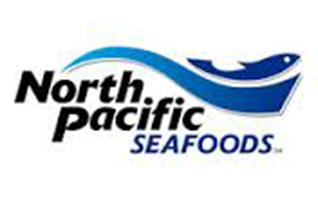 Two Cook Inlet processing facilities will be added to a growing list of salmon production businesses owned by the Seattle-based North Pacific Seafoods. The acquisition, announced Tuesday, will add the Kenai and Kasilof plants currently owned by Inlet Fish Producers to the North Pacific Seafoods operates in Alaska. North Pacific Seafoods is a subsidiary of the Japanese trading house Marubeni and the deal cost the company about $8 million, according to the Japanese business and financial publication Nikkei Review Read the rest here 20:11
Two Cook Inlet processing facilities will be added to a growing list of salmon production businesses owned by the Seattle-based North Pacific Seafoods. The acquisition, announced Tuesday, will add the Kenai and Kasilof plants currently owned by Inlet Fish Producers to the North Pacific Seafoods operates in Alaska. North Pacific Seafoods is a subsidiary of the Japanese trading house Marubeni and the deal cost the company about $8 million, according to the Japanese business and financial publication Nikkei Review Read the rest here 20:11
Kodiak fish processor slapped with $205,000 fine for illegally dumping ammonia
 Kodiak fish processor North Pacific Seafoods pleaded guilty Tuesday in federal court to illegally dumping ammonia into the Kodiak city sewer, while the processor’s chief engineer faces charges of his own. North Pacific Seafoods is a Seattle-based company and a subsidiary of Japanese corporation Marubeni. It owns five seafood processing plants in Alaska. Read more here alaskadispatch.com 15:51
Kodiak fish processor North Pacific Seafoods pleaded guilty Tuesday in federal court to illegally dumping ammonia into the Kodiak city sewer, while the processor’s chief engineer faces charges of his own. North Pacific Seafoods is a Seattle-based company and a subsidiary of Japanese corporation Marubeni. It owns five seafood processing plants in Alaska. Read more here alaskadispatch.com 15:51


































